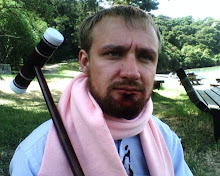OK, I'm sick of hearing about Columbine too. I'm sick of the pundits and Nancy Grace and the fact that Oprah got headlines for NOT talking about it. But it happened twenty minutes from my childhood home, so it matters to me, and all the pundits all seem to miss the point entirely. I am sick of listening to them. So I want to hear from people who were there and people who went to high schools elsewhere at the same time: Compared to the rest of the world, were the southern Denver suburbs really that bad? (If you want to comment or send me emails I'd love to hear from you)
-------
I've tried and failed to write about Columbine countless times since it happened, which is odd, because I have no problem writing about Iraq, or Katrina, or pirates -- things I have had very little to do with. It may have something to do with the fact that I used to film lacrosse games and play various forms of sportsball on the Columbine grounds. I sort of knew one of the victims from a kegger. It looks like Dylan and Eric's yearbook photos were taken at the same place mine were. I recognize the main door to the school. I know where the bathroom is in relation to the gunfire. I knew how it smelled outside -- like dry grass (everything around there smells like dry grass) -- and how it would feel to be there -- my skin would have been permanently cracked from the altitude and dry air.
Every time I try to write about Columbine, I fail. I fail because I only vaguely knew one victim, so I feel as if I have no right to say anything in the voice of someone who was affected. I fail because the day it happened -- as I watched it in my freshman dorm room a thousand miles away while my douchebag roommate made fun of the teacher bleeding to death on national television -- I went outside, cried, went to the bathroom to throw up, called all my friends from home, and had the same conversation, over and over and over: "It finally happened." I have no idea why that second word, "finally," was in there. I fail because I don't know why I wasn't surprised.
I fail because I can't write that I wasn't surprised. I can't say that the south part of Denver in the late 90's was one of the most terrible places to go to high school ever. So terrible, in fact, that almost no one my age I talked to about it who fell at all into the realm of "not fitting in" could say they were surprised at all that a couple of misfits killed thirteen people there. I can't say that because, after all, we were all pretty wealthy. Many of us had parents who cared for us. We had sports practice and school books and everything provided for us that was supposed to be provided for us. I also can't say that because it would disrespect the place that was so badly damaged by two people who will go down in history as a couple of the greatest villains in modern history. It does not sound good to say, "Oh, of course it happenedthere. That place was a cesspool." It's just not done.
Instead, I should say it was all Dylan and Eric's fault. If not that, it was Godlessness, or the suffocation that comes with born-again Christianity, or video games, or absentee parents, or runaway liberalness, or Marilyn Manson, or runaway conservatism, or just the death of American values in general.
Those reasons are all a bunch of crap, and everyone knows it. But if they are a bunch of crap, I don't know WHY I knew. Why I was unsurprised. And I hope you all can help me.
High school is a tough time for most people. I'm not sure what made Colorado in that time period different, if it was different at all. I can't place it. I do know that I was scared, all the time. I do know that I did a lot of things I was not proud of. Racist things. Homophobic things. Sexist things. I know we had coaches who didn't believe in women driving. I know that I saw a teacher tell a group of students "I don't really believe that" after the administration had forced the teacher to give a speech condemning an act of vandalism against an out gay student's car. I know that everywhere I go in San Francisco, I run into people who came here to get away from there. Refugees. I know people who grew up in other places that were not harassed for liking things that were not sports. Who were actually popular AND into writing or drama. Who knew out gay people. Who dressed in black and were accepted. Who proudly said the poor should be included in things. Who thought of the Mexicans as people, even friends. But I also know that a lot of places in the late-90's were terrible, and that Columbine -- and South Denver in general -- might not be unique at all.
I don't have an answer for you. I can't place what that feeling is, why I and many of the friends I spoke to were unsurprised. What do you think? Did you grow up there? Were you surprised it happened at Columbine? Did you grow up somewhere else? What was your high school like? Leave ideas in the comment section or send me an email if you're so inclined.

